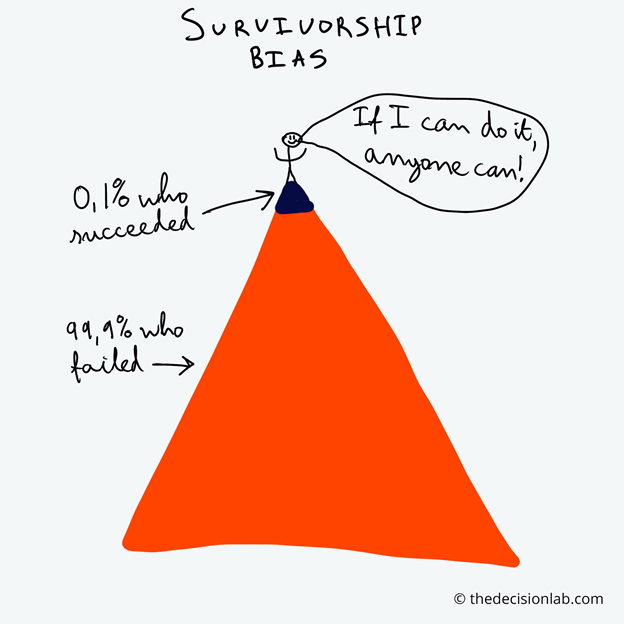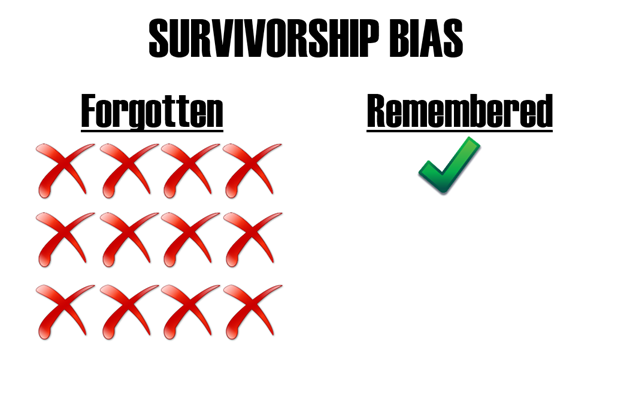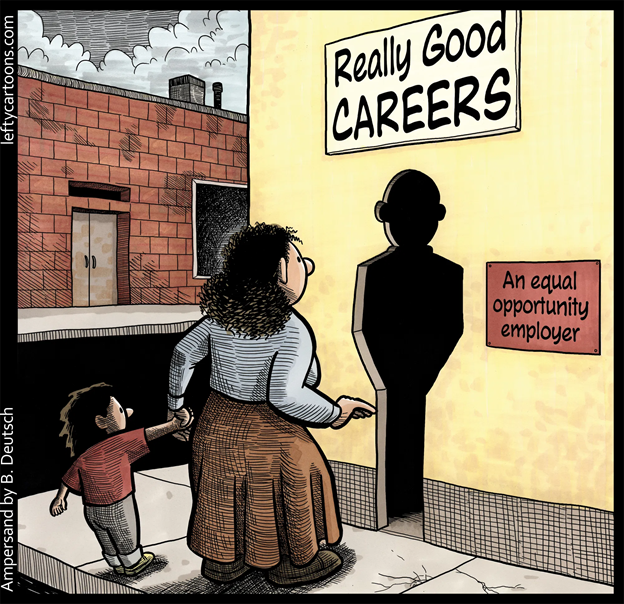On Survivorship Bias and The Job Hunt
Sick of hearing “if I can find my dream job, anyone can” and then not having much luck? Today we’ll explore Survivorship Bias and how statements like that aren’t helpful. Oh yeah… and we’ll give you some actually helpful advice on how to find that great job.
Meet Melissa Reid, a super inspiring British Paralympian. With a long list of British and World titles in sports like Aquathon (swim/run) and Duathlon (run/bike/run), she is blind in one eye and partially sighted in another. Melissa is a remarkable person, who has used the phrase, “If I can do it, anyone can!”
But can we?
Statistically… Probably not.
Are hopeful messages like this encouraging or discouraging? Can I do it if I work harder? Or if I work hard and don’t manage to win championships, am I just a lesser being?
I have often heard executives and tenured professionals issue similar advice about the job hunt. If being hired as CEO happened to me, it could happen to you.
Is it possible that we all have an equal shot of being Jeff Bezos?
No.
Jeff Bezos, Melissa Reid… these are exceptional stories, not the norm. But simply hearing about only these exceptional people leads to something called Survivorship Bias.
Do you know anyone like this?
Survivorship Bias is a logical error where we overweigh the success stories without fully considering past failures.
We often hear about stories of exceptional success, but stories of failure – which make up the vast majority of occurrences – just aren’t as catchy. So we hear about them less.
This causes us to shift our perceptions of how likely something is. Paying attention to success stories warps our perspective of the base rate. The base rate is the probability of an outcome from a sample population – i.e., what is the percentage of people who become tech billionaires out of the general working population? Focusing on these individuals, while there is a lot we can learn from their behaviours about success, doesn’t mean that doing exactly the same thing will lead me to the creation of my own Amazon (which I would call Sassazon).
It’s easy to remember the successes
I’ve heard so many stories from Baby Boomers who simply “walked into the office of the Bank’s headquarters” and they offered them a job. In case anyone has noticed, that’s not how things work these days. These days it’s more likely to send out 50 applications and maybe have one reply.
It’s not like it used to be
Why Are We So Likely To Fall Prey To Survivorship Bias?
🡺 We love an underdog story. It gives us hope that something great can happen to us, too. This could be related to the Positivity Bias, our tendency to overweigh the positives, especially when the information or potential outcome applies to us. Having someone tell us we can be successful too, just like them, well that is very appealing!
🡺 We have a limited understanding of cause and effect. What this means is we tend to assume that doing the exact same things is likely to lead to the exact same result. The truth is, lots of times success is, well, random. It depends more on the context rather than you and your abilities or efforts. Imagine Jeff Bezos’ idea for Amazon but 30 years earlier. He had the good fortune to be in the right place at the right time, as well as his own ideas and efforts. If I did exactly the same things as him now, I likely wouldn’t get anywhere at all, because the context is different.
🡺 There’s likely a connection between the Survivorship Bias and the Availability Heuristic. The Availability Heuristic refers to how immediate examples that come to mind are taken as more likely to happen in the future. We are more likely to recall things that are vivid, immediate, and emotionally charged. Like, say, a striking story of a college dropout who goes on to become a billionaire (Bill Gates). The stories of a college student applying for a job and getting rejected just doesn’t have quite the same ring to it.
But you also didn’t have email when you started so…
Why is Survivorship Bias Problematic?
It’s discouraging. If anyone can do it, and I still haven’t found my ideal job (or any job), is there something wrong with me? That’s what stories and statements rife with survivorship bias imply.
It’s unhelpful advice. Doing the exact same thing as these exceptionally successful people is not likely to yield the same result. It might if you could make everything in the context exactly the same, but that’s quite impossible.
It can be hard to see the barriers you didn’t have to face
What is Some Actual Good Job Hunting Advice?
Keep a realistic eye to the current conditions in the labour market. In trying to diagnose what might be the hurdle in the job hunt, it’s important to isolate the ”is it me?” from the “it’s just tough out there”. MBA students who are all competing for the same handful of MBB jobs need to know that it’s likely not them, but rather a really, really tough context. Even qualified candidates don’t get the job for a multitude of reasons and documented biases. Don’t worry, MBA students, likely it’s not you. McKinsey reported getting over a million applications per year, and hiring under 1% of candidates.
Keep pushing yourself. It can’t hurt to keep gaining new skills.
Leverage your network. This way you can know what the chances are in your target job, what they are looking for, and even when there is an open position.
Don’t give up. Don’t be discouraged, especially not by other people’s success.
Be flexible. Are your job search tactics not working for you? Be open to pivoting. Alternatively, open yourself up to other opportunities you haven’t considered before. But do it with caution – considering too many options will lead to choice overload, and divide your efforts in applications and networking in your chosen area. But
Cut yourself some slack. Rejection is hard, but the truth is that it’s the norm. Think about the bright 1 million candidates applying to McKinsey. 990,000 of them are rejected. That’s a lot of rejection – but we are all very likely to experience this.
Next time uncle Bob tells you about how easy it was to get a job back in his day (implying that it should be for you as well… if you were as good as him) just smile and nod. Times are different. Here are some interesting statistics:
In the US, less than 70% of 25- to 34-year-olds were in the workforce in 1970; whereas now that number is over 88%.
Manufacturing jobs have declined considerably, from 19.4 million in 1979 to 11.5 million in 2010 in the US. This suggests more education is required now for a number of jobs.
Adults are also staying in the workforce longer; forty years ago it was around 12% of people over age 65 and now it’s closer to 20%.
You are enough. Things are just more competitive now. Bottom line: don’t give up!
You got this!
Dr. D








